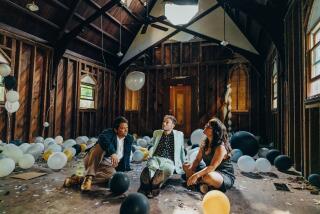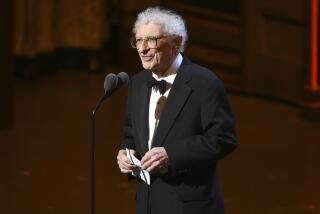JAZZ REVIEW : Connick Concert Has Fans Cheering
- Share via
SAN DIEGO — A tribal drum pattern hailed the throng’s attention, the curtain rose and a tieless, designer-suited Harry Connick Jr. strolled onstage to command his 17-piece orchestra, poised behind white bandstands bearing the logo “HC.”
Red, white and blue lights flashed as the full band kicked in, and Connick launched his spring-summer touring schedule with the first of three consecutive sold-out nights at the San Diego Civic Theatre on Friday, to thunderous approval from adoring fans.
The way he commands a crowd, it’s hard to believe that Connick is still only 24, early in his formative years as an artist. At this point, his voice is passable but not superb, pleasant enough on the romantic ballads he favors, even if he doesn’t add the spontaneous vocal twists that would mark him as a serious jazz singer. Connick acknowledges he doesn’t expect to hit his vocal prime until he’s 35.
On piano, too, he’s looking for an identity. He is an adequate accompanist in a Big Band setting, but his solos are simplistic and don’t rank him anywhere close to such talented young players as Marcus Roberts, Michel Camilo and Kei Akagi.
Even so, there is something irresistible about Connick. He is charismatic to the max, and you have to admire the way he gets the most out of his journeyman talents.
Friday’s show suffered from some opening-night kinks, but for the most part the evening proceeded smoothly, sped along by Connick’s electric personality and quick sense of humor. A few songs were ruined by clicks and pops in the sound system, and Connick struggled to hit a relaxed, spontaneous stride on piano.
But these flaws seemed to go unnoticed by a dressed-to-kill crowd predominantly representing Connick’s 25-to-40-year-old demographic, including several women who squealed, called out song titles and handed bouquets to their heartthrob at show’s end.
Connick is touring in support of his newest recording, “Blue Light, Red Light,” a collection of all-original, often romantic Big Band jazz and swing tunes with which he attempts to recapture the mood and spirit of an earlier era. Released last fall, the album immediately shipped 600,000 copies and will undoubtedly sell in the millions. Last week, it stood at No. 10 on Billboard’s jazz chart after 29 weeks.
So it came as something of a surprise that Connick’s show included only three songs from the new release: “He Is They Are,” “Just Kiss Me” and “You Didn’t Know Me When.”
Even though his new material, most of it co-written with lyricist Ramsey McLean, is surprisingly solid for such a young composer, Connick relied mostly on nostalgic numbers by some of his songwriting role models from America’s romantic past, including Cole Porter (“It’s All Right With Me”), Rodgers and Hart (“I Could Write a Book”) and Duke Ellington (“Don’t Get Around Much Anymore”). Some of these warm, comfortable standards appeared on earlier Connick releases, such as the 1990 “We Are in Love” (which earned him a Best Jazz Vocal Grammy) and the 1989 “When Harry Met Sally.”
Along with the music, an evening with Connick comes with many surprises. Between songs, he tells jokes, jives with his band and shows off some of his ancillary skills, such as trumpet playing and tap dancing.
Subjects of his homespun humor ranged from Grape Nuts (“How many people ever finished a bowl?”) to Lawrence Welk’s television program (as a boy, Connick claims, he kissed the televised lips of the girls on the show). And when Connick snapped his fingers twice during a break in the song, “Bare Necessities,” he called it “The Addams Family part,” a reference to the theme music for the 1960s television show.
Connick spent more time singing than playing piano. As he sang, he moved gracefully across the stage, one moment taking a Fred Astaire turn complete with a high kick, the next wiggling his buns (even though he takes a prudish stance in interviews) with a Presley-like effect on women.
While Connick’s personal warmth, sincerity and genuine good humor propelled the show smoothly forward, they couldn’t mask his limitations as a musician, which became increasingly apparent as he tried to keep pace with his talented bandmates.
Trumpeter Leroy Jones is a gifted player who could hold his own in any Big Band horn section. So are tenor saxman Jerry Weldon, drummer Shannon Powell and trombonist Lucien Barbarin. All ran circles around Connick’s piano improvisations. His solos are all hype and no substance, highlighted by plenty of ham-handed banging and gimmicky speed runs that arouse his devotees but don’t amount to genuine invention.
Viewed in a broad context, Connick’s popularity is disturbing. He is making a living by recycling great American music and nostalgia without giving them an original spin. His vocal interpretations do not break new ground, his piano improvisations don’t shed new light on the precious old standards he borrows, and his Big Band arrangements are only competent.
Still, it’s not hard to see why his appeal is so great. At a time when urban unrest is at a new high, when violence is played up in youthful music ranging from rock to rap to heavy metal and when the media spew a steady stream of bad economic and political news, Connick’s idealistic romantic fantasy songs, delivered by a handsome crooner dressed like royalty, offer an irresistible avenue for escape.
Connick’s new release shows promise, though. If his original composing continues to mature and his playing and singing keep pace, he may yet emerge as an important artist.
More to Read
The biggest entertainment stories
Get our big stories about Hollywood, film, television, music, arts, culture and more right in your inbox as soon as they publish.
You may occasionally receive promotional content from the Los Angeles Times.










